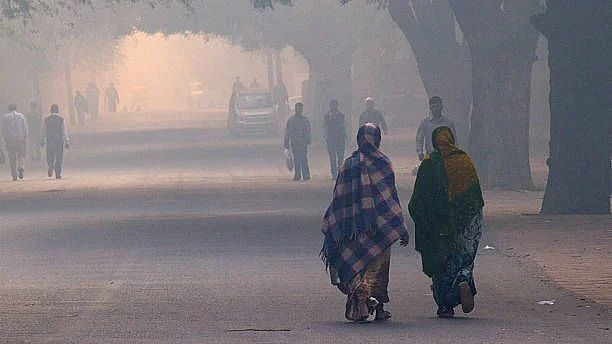According to the latest edition of the Air Quality Life Index (AQLI) released by the Energy Policy Institute of the University of Chicago, Air Pollution has reduced India's life expectancy by five years - a devastating cost for the citizens.
Bangladesh, India, Nepal and Pakistan are ranked among the five most polluted countries in the world, accounting for 60 percent of the person-years that would be lost globally if current pollution levels persist.
All of India’s 1.3 billion people live in areas where the annual average particulate pollution level exceeds the WHO guideline, found the report.
63 percent of Indian cities surpass the national standard AQI of 40 µg/m3 (micrograms per cubic metre).
A 2019 Lancet study had also found that air pollution was the culprit behind 16 lakh deaths in India, making up almost 17.8 percent of the annual deaths.
“Since 2013, about 44 percent of the world’s increase in pollution has come from India, where the particulate pollution level has increased from 53 µg/m3 then, to 56 μg/m3 today — roughly 11 times higher than the WHO guideline.”AQLI Report, University of Chicago
What is India Doing?
In recent years, the residents of India recognized air pollution as a major health threat and the government is beginning to respond.
In 2019, the Government of India launched its National Clean Air Programme (NCAP) that aimed at reducing harmful particulate matter levels by 20-30 percent before 2024, which is non-binding.
There is still hope for the country if the air pollution levels set by WHO are adhered to- life expectancy could increase by 10.1 years in Delhi, 7.9 years in Bihar, and 8.9 years in Uttar Pradesh, states the index report.
"India’s National Clean Air Programme has the potential to save 1.6 years of life," added the authors of the Chicago Study.
Since 2013, about 44 percent of the world’s increase in pollution has come from India.
After a long period of time, WHO also revised its guidelines and rehashed the ideal range for a particulate matter PM 2.5 to below five micrograms per cubic metre, on an annual average.
PM 2.5 is extremely dangerous to human body, as its small size allows it to penetrate our lungs, as well as enter into our bloodstream, putting us at risk for respiratory and cardioivascular diseased.
AQLI Director Christa Hasenkopf, in her statement, mentioned that by updating the AQLI with the latest WHO guidelines, we can understand the high cost we all pay to breathe air.
She further advocated, that now that we have substantial evidence of the deplorable effect air pollution has had on human health in the past years, there is a stronger case for governments to prioritise it as an urgent policy issue.
India's Report Card
India's performance in the AQLI has not improved since the last year.
As per the index, the high pollution levels are primarily because of industrialisation, economic development, and population growth. The road vehicles have shown a four-fold rise in their numbers since early 2000s, as well.
The report also mentioned that electricity generation from fossil fuels in India has tripled from 1998 to 2017.
The worst affected regions in the country are Bihar, Delhi and Uttar Pradesh.
Home to almost 200 million people, states like Maharashtra and Madhya Pradesh have presented a significant rise in their pollution levels by 68.4 percent and 77.2 percent, respectively, since the 2000s.
In these states, the average person loses about 1.7-2.5 years of life expectancy.
In a previous AQLI Report, it was found that, globally, air pollution costs an individual more years of his life (2.2 years) than anything else- Unsafe water and sanitation (7 months), HIV/AIDS (4 months), malaria (3 months), Conflict and terrorism (9 days), Smoking (1.9 years) , and Alcohol use (8 months).
The AQLI reflects how a country understands the risks and if, it prioritises the well-being of its citizens.
It provides an opportunity for countries to improve health and increase life expectancy if only, they are willing to accept the costs of environmental regulation.
The shroud of responsibility now falls on the governments' shoulders- a stringent policy like China (brought down the global average of pollution levels since 2013) might just be the way to a longer, and hopefully, a safer life.

